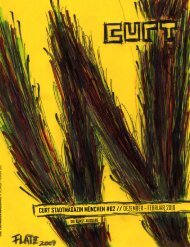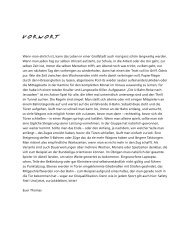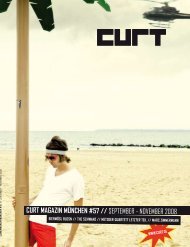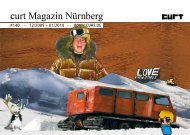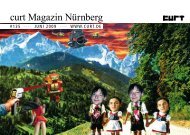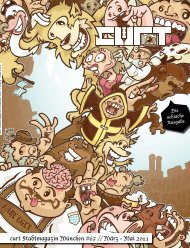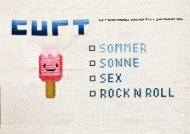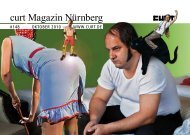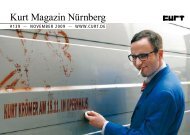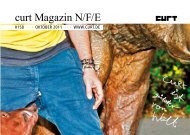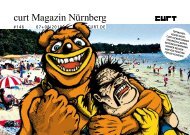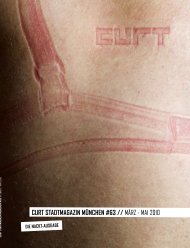Erfolgreiche ePaper selbst erstellen
Machen Sie aus Ihren PDF Publikationen ein blätterbares Flipbook mit unserer einzigartigen Google optimierten e-Paper Software.
::::::::::::: 0044 . CURT TRIFFT JED RUBENFELD<br />
ed Rubenfeld<br />
MIT SEINEM BUCH “TRAUMDEUTUNG”, EINEM KRIMI MIT UND ÜBER SIGMUND FREUD IM NEW YORK<br />
DES JAHRES 1909, HAT JED RUBENFELD GERADE DEN BRITISH BOOK AWARD GEWONNEN. AUSSER-<br />
DEM IST ER PROFESSOR IN YALE, EXPERTE FÜR VERFASSUNGSRECHT, VATER VON ZWEI KINDERN<br />
UND AUCH SONST EIN SUPER TYP. AUF SEINEM STOP-OVER IN MÜNCHEN TRAFEN WIR UNS UND<br />
ANALYSIERTEN EIN BISSCHEN IN DEN TAG HINEIN. TEXT UND FOTO: JAN VOSS<br />
curt: Is it exciting for you that this is the place (Mu-<br />
nich) where Freud and Jung last met in 1912?<br />
RUBENFELD: Was it Munich? I didn‘t know that. We<br />
went to Vienna and visited Freud‘s house. I felt chills<br />
down my spine when I stood in those rooms. I have<br />
never been there before. To touch furniture that he<br />
touched was a great experience.<br />
curt: For your book you changed places, names and<br />
times of actual events to turn it into a Thriller?<br />
RUBENFELD: It‘s a tricky thing you‘re talking about. A<br />
great deal of the book is based on fact. The murder<br />
mystery is all fictitious, of course. Much of the rest of<br />
the book is factual. If it is going to work as a novel,<br />
first obligation is to the narrative and that means<br />
sometimes you have to take certain liberties with the<br />
facts and that is a dangerous game because readers<br />
expect the factual material to be accurate and I wan-<br />
ted to make it as accurate as I possibly could. Most<br />
of the details, most of the dialogue, everything that<br />
goes on between Freud and Jung is factual based.<br />
I took scenes from Europe and transferred them to<br />
America, I took scenes from 1910, 1911 and put<br />
them back in time to 1909.<br />
curt: You must have spent a long time researching?<br />
RUBENFELD: I can‘t count the hours. It was endless<br />
researching. I read thousands of old newspaper arti-<br />
cles. Just fascinating. You can do it on your computer<br />
now. You don‘t have to go to a library. All the old<br />
newspapers are archived and they‘re searchable by<br />
word. If you type in „Freud“ for example you can see<br />
every article that is written between 1905 and 1915<br />
on Freud in major newspapers. Before it would have<br />
taken years to find that information. Now it takes<br />
10 seconds.Being able to read those articles on New<br />
York City and Freud in 1909 you can really immerse<br />
yourself in popular culture and what people were<br />
talking about. Twenty years ago that would have<br />
been impossible.<br />
curt: And it was your wife‘s Idea to write the book?<br />
RUBENFELD: Yes it was. She got tired of me complai-<br />
ning that no-one was reading my academic work,<br />
so she said „why don‘t you try writing something<br />
more popular, like a novel?“ and I said „how can I<br />
write something like a novel? I can‘t write a novel.“.<br />
She said „sure you can“ and she even said „why<br />
don‘t you write something about Psychoanalysis.<br />
You know about Freud!“ And it occurred to me: why<br />
not about Freud himself in 1909, because there is<br />
this mystery about his trip to America. He comes to<br />
America and, objectively speaking, has a fantastic<br />
trip. The most famous Philosophers and Psychologists<br />
come down from Harvard and he‘s written up in<br />
newspapers.<br />
I mean, Psychoanalysis takes off in America. It beco-<br />
mes the dominant school of psychiatric thought. And<br />
yet for the rest of his life he won‘t come back, he<br />
refers to Americans as savages, he blames this trip to<br />
the US for the breakdown of his health and no-one<br />
knows why, to this day. So I thought, this could be an<br />
interesting novel and started thinking about how to<br />
fill it. That‘s when I took the Dora case. I didn‘t want<br />
to create some fake Freudian analysis that would<br />
just be either wrong or stereotypical. Instead I took a<br />
real Freudian case and transplanted it from Vienna to<br />
Manhattan and made that the core of the psychoana-<br />
lytical part of the story.<br />
So all of what Nora says to him about her family, her<br />
father, her fathers best friend ...all that is what Dora<br />
said to Freud. And Freud‘s interpretation that he<br />
offers in the book about what‘s really going on in her<br />
head is exactly what he said to Dora. It was great fun!<br />
curt: What is your opinion on J. Masson who claims<br />
that Freud once wrote a big thesis on child abuse as a<br />
main cause for Neurosis and then later buried it again<br />
due to outside pressure in his early years?<br />
RUBENFELD: You know that stuff is not true.<br />
curt: Masson is crazy?<br />
RUBENFELD: No, Masson is not crazy. There is a<br />
period in Freud‘s early studies when he is beginning<br />
to talk to patients and let them tell their own stories,<br />
their own sexual life which is scandalous and everyo-<br />
ne is outraged that he‘s doing it. Many of his patients<br />
begin to tell him of events that sound as if they are<br />
describing sexual relationships that happened with<br />
their parents, let‘s say a woman with her father when<br />
she was a little girl.<br />
There is a moment when he writes and lectures<br />
saying that we need to be more concious and that<br />
there is a possibility that there is more abuse of this<br />
kind then we are prepared to admit. He never retracts<br />
that. Later when he begins to develop psychoanalyti-<br />
cal ideas he says „a lot of this material may have not<br />
really happened”. They may be describing what he<br />
will then later call the Oedipal complex. It is all very<br />
exaggerated. He said, there may be more going on<br />
than we are able to admit.<br />
curt: In the book, Freud seems to be a nice father<br />
figure whereas when you read his books he seems to<br />
be very cold.<br />
RUBENFELD: I don‘t think so. His writings strike many<br />
people as cold and formal. I am an admirer of his<br />
writing and his writing style. Jung‘s style is more alive<br />
and you can easier connect with him. Freud seems<br />
very distant. Its part of their characters, but many<br />
people who new Freud tell of a person who is very<br />
warm and someone they could relate to and I think<br />
he had to be that way to become the first practitioner<br />
of Psychotherapy. Nowadays orthodox Psychoanalysts<br />
never intervene with their patients.<br />
It‘s all free association, the patient speaks, they are<br />
not allowed to look. In fact Freud said right next to<br />
them and he was much more interventionist and he<br />
developed very good friendships with women and<br />
men that were very close and warm.<br />
So I think in real life he wasn‘t the same guy as you<br />
might get the impression of from the writing.<br />
curt: You‘re not that excited that your book might<br />
become a movie?<br />
RUBENFELD: If they make it into a movie it would<br />
be great, but it won‘t be my book. It‘s not the right<br />
attitude. A lot of authors feel like „it‘s my book. Are<br />
they going to be true to my book?“.<br />
Movies are completely different. It‘s not like they<br />
will call me and ask about my opinion. They buy the<br />
rights, they never want to talk to you again.<br />
curt: Thank you very much for the interview.



